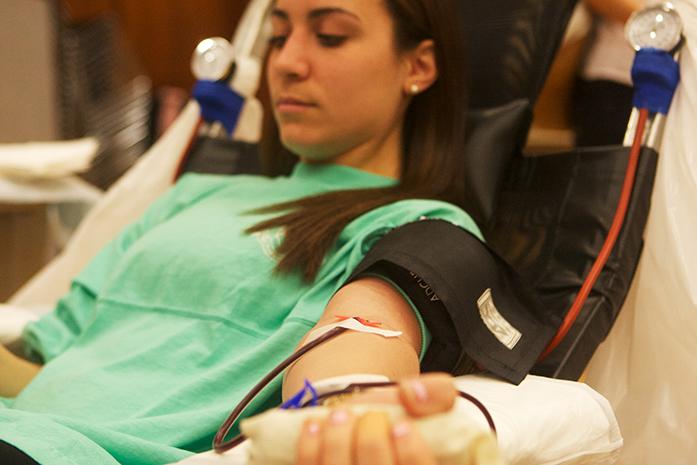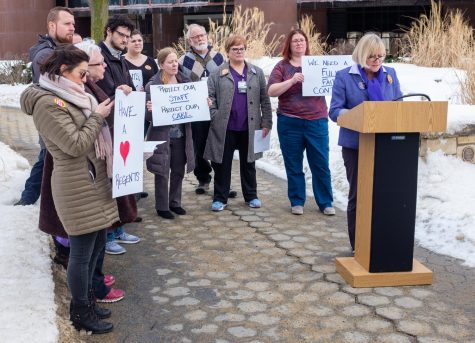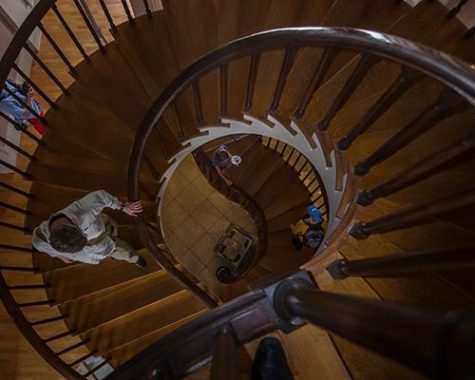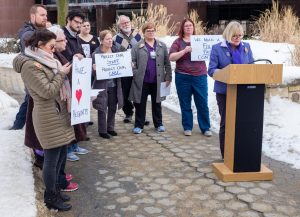Polar winds lead to critically low blood donations
Local blood centers are searching for blood donors, as the weather prevents people from coming in and their shelves begin to run low.
Nikki Gierman donates blood for the Greek Week blood drive at the IMU on Monday, April 7, 2014.
February 14, 2019
Local blood centers are searching for people willing to give blood after a sharp decrease in their supply following the polar weather.
According to the American Association of Blood Banks, 38 percent of the U.S. population is eligible to donate blood or platelets, but only 10 percent actually do. That struggle to search for donations is being compounded by the winter weather, local blood-center workers say.
DeGowin Blood Center donor recruitment coordinator Kerry DuBay said the extreme winter weather Iowa has experienced has resulted in a critically low level of blood donations, forcing the center to rely upon what’s stocked on its shelves.
“We have seen a lot lower donation rates; it’s been a brutal winter,” she said. “Unfortunately, the need for blood never goes away. Use remains high. We’re actually experiencing really high use.”
While blood donations do have a shelf life, DuBay said the center has different levels of different blood products and types, and eventually it will need to rebuild those inventories. Type O blood and platelets are especially lacking, she said.
RELATED: As blood donations decline in the summer, a 7-year-old shows why it matters
“That’s when we send out the plea to donors to restock our shelves,” she said. “Right now, when we do have a day that it’s nice for someone to come here, we would really appreciate them coming in to donate.”
The icy roads and freezing temperatures make it difficult for donors to reach the center, and the latter has resulted in cancellations. Several blood drives in the community have been postponed or canceled.
Mississippi Valley Regional Blood Center marketing coordinator Anna McFarland said anyone who lives in an area without winter weather is especially encouraged to donate blood or platelets.
“We do see every January a decrease in donations just because of the cold weather and the holiday season,” she said. “However, in 2019 we’ve had snow storm after ice storm after cold for an extended amount of time.”
Similar to DeGowin, Mississippi Valley has also seen a critically low number of blood donors come in, McFarland said. Mississippi Valley officials have prepared shelves of blood by proactively ensuring that people donated before the polar weather, McFarland said, so its blood supply is satisfactory for now.
We have seen a lot lower donation rates; it’s been a brutal winter. Unfortunately, the need for blood never goes away. Use remains high. We’re actually experiencing really high use.
“Hospitals have an inventory level they are looking to meet daily, so we’re supplying that,” McFarland said. “Blood is something that cannot be manufactured or produced; it’s something that’s given by volunteer donors.”
Mississippi Valley works with DeGowin to supply the UI Hospitals & Clinics and the Stead Family Children’s Hospital with blood products for anyone from cancer patients to burn victims. In addition, DuBay said, donated blood aids in mass bleeding situations and transfusions.
Blood donor Sean McIntyre, who tries to donate at DeGowin every couple of weeks, said the polar weather did not change that. The weather was only an issue until he reached the center’s parking ramp, he said, and then he was in the clear.
“I try to go on a regular basis, because I know that’s what they count on,” McIntyre said. “Blood products don’t last forever, just as long as they can stay in the freezer.”
His awareness of the UIHC need for blood products, especially during the holiday season, McIntyre said, prompted him to go to DeGowin despite the extreme weather.
“I think depending on the weather, people who don’t give regularly may tend to forget,” he said. “It’s important to remember the reasons we’re doing it.”





















